February 2023 College & Young Adult Conference
.

Alternating Sundays:
9 AM Orthros Prayer Service &
10 AM Divine Liturgy Communion Service
—
10 AM Typica Service
—
The 10 AM Sunday services are followed by Coffee Hour and Fellowship.
FAREWELL MESSAGE FROM FR. MARK:
"Today is my last Sunday as the priest of the parish. I'm very grateful to have served you for the past 6 years. I hope the parish will flourish and grow in the future.
"You are very blessed to have a priest of the caliber of Fr. Nektarios to take over your care. I will continue to pray for you all and hope you will pray for me and my family. God bless! Father Mark."
~
HOUSE BLESSINGS / HOLY CONFESSION
Please contact Fr. Nektarios at ericmorrow@outlook.com or by phone at 325-642-1340 to schedule house blessings and Holy Confession for the weekend of January 28-29.
~
GENERAL ASSEMBLY OF THE PARISH ON 1/29/2023
Immediately following Divine Liturgy, during Coffee Hour. Everyone please make sure to attend.
~
VASILOPITA AUCTION
Thank you to everyone who participated in January 1, 2023, auction of Vasilopita (St. Basil Bread) to raise money for St. Basil Academy. The breads were beautiful, and the donors were generous. Thank you all!
St. Basil Academy is a national not-for-profit philanthropic center for orphaned children and young adults in need. Their mission is to provide a safe and supportive environment where children and young adults are nurtured to become healthy members of society with vision and hope. Please join us in supporting this worthy organization.
~
UPCOMING SERVICES
~
ONLINE CATECHISM CLASS
Join us for our weekly catechism class, online via Zoom. Your host is Fr. Nektarios Morrow.
All are welcome. Whether you are an experienced Orthodox, a serious enquirer, or a complete newbie, feel free to join us for discussion and learning.
Catechism Session: Our next class will be on Wednesday, January 18 - 7:00 pm - We are moving to a new day just for the short term.
Sessions will still be recorded and posted to Youtube at https://www.youtube.com/@st.stephenorthodoxmission8116/streams. Please join us as we will cover Chapter 5 in The Orthodox Church by Timothy Ware - "The Church under Islam."
Previous classes are archived on YouTube at https://www.youtube.com/channel/UC7ronGHeNPzEgi9mDcF0Y2A/streams
Zoom link: https://us02web.zoom.us/j/9299265692?pwd=cytWQUQ2Z1JrdnZ5czliMTR2dktoQT09
Meeting ID: 929 926 5692
Passcode: Grace22
Questions? Email Fr. Nektarios
~
Orthodox Homeschool Mom's Luncheon
Saturday, January 28, 2023 11:00 am - 2:00 pm
Registration:
Location:
St. John the Baptist Greek Orthodox Church
(held in the Parish Center/Church Hall)
303 Cullum Drive
Euless, TX 76040
Ticket Cost:
More Information: https://onrealm.org/stjohndfw/PublicRegistrations/Event?linkString=NjI1YWQ0MjktZTIzYi00ZTkxLTg1OTEtYWY1YjAxMjE2YmIx
~
FASTING
Question: Why do we fast?
Answer: Because Christ did. He also said that we need to fast to increase our spiritual strength. “This kind can come out by nothing but prayer and fasting.” (Mark 9:29)
Answer: Because Christ was betrayed on a Wednesday, and crucified on a Friday.
~
CARING MEALS MINISTRY
If you know someone who needs meals due to illness, birth, etc., please see Kathy Baughman or Noelle Bartl. Thank you to everyone who volunteers for this ministry. You are being the hands of Christ!
~
BAKE SALE FUNDRAISER FOR CHURCH
We are still accepting orders for Greek Pastries. All proceeds go to supprt the operating costs of our parish. Please contact Wilma Dunias, a member of our parish, at baklavabywilma@live.com or 720-989-7928.
~
HELP FOR THE GARCIA FAMILY
~
PARISH COUNCIL
The next meeting will be in January, during Coffee Hour.
~
COFFEE HOUR
We have open slots on the sign up sheet for Coffee Hour, which can be found on the refrigerator in the church kitchen. Can you help host? It's okay to bring something simple, or even just one dish. Encourage others to sign up with you as co-hosts. "Many hands make the burden light." Thank you for your help!
~
Check out the rest of the bulletin online! See below for news from the world of Orthodoxy, online concerts and lecture series, and more.
~
SPECIAL OCCASIONS FOR JANUARY
Birthdays: Joanna Garcia, Marika Harris, Amy McDaniel
Anniversaries: Fr. Mark Lichtenstein, Ordination to the Diaconate on St. Anthony’s Day
Namedays:
1/1 Tim Beys (St. Telemachos the Martyr)
1/2 Dustin Clopton (St. Seraphim of Sarov)
1/7 John Choate, Joanna Garcia, Joanna Kalaitzes, John Pete Kouvelis, John Lichtenstein, Heidi Papachristos, Joanna Weir, John Wimberley (all named after St. John the Baptist)
1/13 Hilary Choate (St. Hilary of Poitiers)
1/17 Anthony Bartl (St. Anthony)
Memorials: none
~
AFTER CHURCH
Please join us for refreshments in the Social Hall.
** As always, see the parish website for any changes and updates. **
JOYFUL FASTING
When you hear that Lent is coming, do you close your eyes and groan? What if I said there is a secret to not starving when you fast — would that help you fast more cheerfully?
Well, there is. Fasting is about more than just food, of course, but let's face it: It's hard to do those other things when we are low on energy due to not getting good nutrition.
So here it is: The secret to fasting without starving is eating complementary protiens, such as beans + rice.
Proteins are made of amino acids. Meats, seafood, and dairy have all the amino acids our bodies need, so they are called "complete proteins."
Most fasting foods, however, rely on "partial proteins." In a beans-and-rice dish, for example, beans have some of the amino acids our bodies need daily...and rice has the others. They are complementary to each other, meaning that they complete each other by being together.
When we pair partial proteins together, we can create a "complete protein." Instead of feeling like we are starving during Lent, we can feel light and satisfied. We just need to know there are two categories of partial proteins, and we need one from each category to create a complete, satisfying protein.
Category 1: Beans*, seeds, peas, nuts**
Category 2: Rice, potatoes, corn, grains, bread, pasta, tortillas
*See below for tips on how to avoid gassiness from beans.
**It is not recommended to bring nut dishes to public events.
Did you know that fasting foods are supposed to be simple to prepare? This is so we can have more time to spend on praying, reading our Bibles, going to weekday services, studying about saints and Church history, giving alms, and doing good deeds for others, as caring Christ-followers should.
These physical actions of devotion, alms-giving, and doing good deeds are part of fasting. Why? Because we are fasting from some of our worldly activities (such as more-elaborate meal preparation) and devoting our time and attention to Christ.
It's not that elaborate meal preparation is unholy — not at all! Fancier cooking is simply an activity we give up on Wednesdays and Fridays, and all during Lent, so we can devote more of our time and energy to Christ.
Even so, fasting food can be tasty! Here are two examples:
Tips:
Worried about gas from beans? Watch this video about proper preparation of beans to make them more digestible.
If you prefer canned beans, we recommend using Eden Organic canned beans. They are prepared with overnight soaking to avoid gassiness.
Actually, soaking is good to do for more than just beans: Soaking any partial protien before cooking improves its digestibility. In other words, soaking before cooking makes it easier for your body to break down the food, and lets you absorb more nutrients from it. For more on this, see the article, "Living with Phytic Acid."
~
COOKBOOK RECOMMENDATION
Looking for a fasting cookbook that deals with modern diets like paleo, gluten-free, and nut-free? That isn't ethnic?
Article on "Joyful Fasting" © 2022 Presvytera Suzanne Thorpe Lichtenstein, used by permission
.
 Today, January 13, 2023 at the Ecumenical Patriarchate, under the chairmanship of His Eminence Elder Metropolitan Emmanuel of Chalcedon, took place the inaugural meeting of the established ten-member Mixed Commission on the topic of the revision of the existing Charter of the Sacred Archdiocese of America.
Today, January 13, 2023 at the Ecumenical Patriarchate, under the chairmanship of His Eminence Elder Metropolitan Emmanuel of Chalcedon, took place the inaugural meeting of the established ten-member Mixed Commission on the topic of the revision of the existing Charter of the Sacred Archdiocese of America.
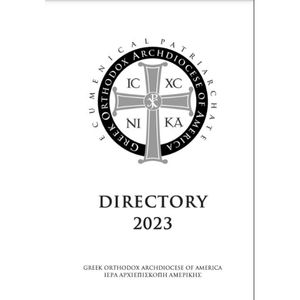 may be downloaded as a pdf and used as a digital book on tablets, smart phones and other devices.
may be downloaded as a pdf and used as a digital book on tablets, smart phones and other devices.
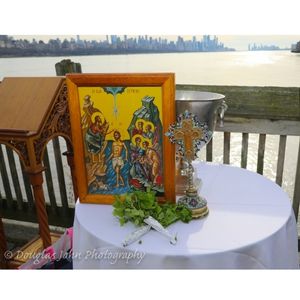 With the blessings of His Eminence Archbishop Elpidophoros of America on Sunday, January 8, 2023 His Grace Bishop Apostolos of Media celebrated the 3rd Annual Metropolis of New Jersey Annual Northern New Jersey Epiphany Celebration in Edgewater, New Jersey.
With the blessings of His Eminence Archbishop Elpidophoros of America on Sunday, January 8, 2023 His Grace Bishop Apostolos of Media celebrated the 3rd Annual Metropolis of New Jersey Annual Northern New Jersey Epiphany Celebration in Edgewater, New Jersey.
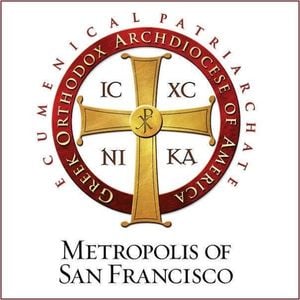 The deluge of rain on the west coast has caused tremendous destruction to several areas on the west coast. While our parish facilities in the affected areas of our Metropolis presently remain safe, the homes of parishioners have been damaged and the surrounding areas have been devastated as a result of these storms. These areas include Marin County, Santa Cruz, San Jose, San Francisco, San Luis Obispo, Sacramento, Los Angeles and Santa Barbara. There are thousands of people in these municipalities who have been adversely affected that need our prayers.
The deluge of rain on the west coast has caused tremendous destruction to several areas on the west coast. While our parish facilities in the affected areas of our Metropolis presently remain safe, the homes of parishioners have been damaged and the surrounding areas have been devastated as a result of these storms. These areas include Marin County, Santa Cruz, San Jose, San Francisco, San Luis Obispo, Sacramento, Los Angeles and Santa Barbara. There are thousands of people in these municipalities who have been adversely affected that need our prayers.
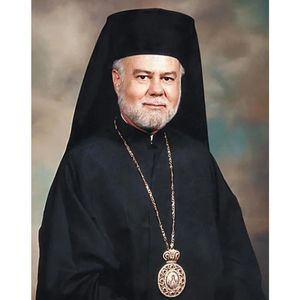 On January 10, 2023 at the suggestion of His All-Holiness Ecumenical Patriarch Bartholomew, the Holy and Sacred Synod of the Ecumenical Patriarchate elevated His Grace Bishop Dimitrios of Xanthos to the rank of Metropolitan and, as such, the see of Xanthos to the rank of Metropolis in his person.
On January 10, 2023 at the suggestion of His All-Holiness Ecumenical Patriarch Bartholomew, the Holy and Sacred Synod of the Ecumenical Patriarchate elevated His Grace Bishop Dimitrios of Xanthos to the rank of Metropolitan and, as such, the see of Xanthos to the rank of Metropolis in his person.
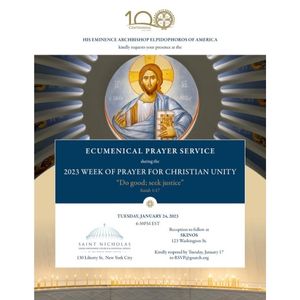 cumenical Prayer Service
2023 Week of Prayer for Christian Unity
cumenical Prayer Service
2023 Week of Prayer for Christian Unity
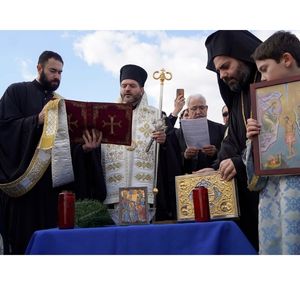 With the blessings of His Eminence Archbishop Elpidophoros of America and after a multi-year hiatus due to the Coronavirus Pandemic, on Saturday, January 7, 2023, His Grace Bishop Apostolos of Medeia celebrated the Annual Maryland Region Epiphany Celebration in Ocean City, Maryland.
With the blessings of His Eminence Archbishop Elpidophoros of America and after a multi-year hiatus due to the Coronavirus Pandemic, on Saturday, January 7, 2023, His Grace Bishop Apostolos of Medeia celebrated the Annual Maryland Region Epiphany Celebration in Ocean City, Maryland.
 His Eminence Archbishop Elpidophoros of America, serving as a member of the Holy Synod, was welcomed today at the Ecumenical Patriarchate by His All-Holiness Ecumenical Patriarch Bartholomew.
His Eminence Archbishop Elpidophoros of America, serving as a member of the Holy Synod, was welcomed today at the Ecumenical Patriarchate by His All-Holiness Ecumenical Patriarch Bartholomew.
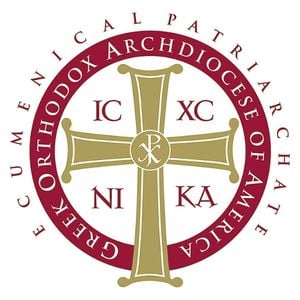 His Eminence Archbishop Elpidophoros of America is currently participating in the regularly scheduled session of the Ecumenical Patriarchate’s Holy and Sacred Synod for the month of January (10-12). Upon the conclusion of this synodal session — under the chairmanship of His All-Holiness Ecumenical Patriarch Bartholomew — the very first meeting of the Mixed Commission on the Charter of the Greek Orthodox Archdiocese of America (“Mixed Commission”) will take place at the Ecumenical Patriarchate on January 13th.
His Eminence Archbishop Elpidophoros of America is currently participating in the regularly scheduled session of the Ecumenical Patriarchate’s Holy and Sacred Synod for the month of January (10-12). Upon the conclusion of this synodal session — under the chairmanship of His All-Holiness Ecumenical Patriarch Bartholomew — the very first meeting of the Mixed Commission on the Charter of the Greek Orthodox Archdiocese of America (“Mixed Commission”) will take place at the Ecumenical Patriarchate on January 13th.
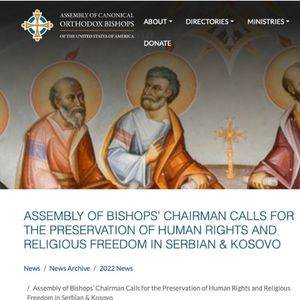 In light of the developing situation between Serbia and Kosovo, including the prevention of Patriarch Porfirije on December 26, 2022 by the authorities in Pristina to visit his historic and primatial see of Peć, His Eminence Archbishop Elpidophoros of America, in his capacity as Chairman of the Assembly of Bishops, conveyed an intervention to The Honorable Secretary of State Antony Blinken. In the letter, the chairman asks Secretary Blinken:
In light of the developing situation between Serbia and Kosovo, including the prevention of Patriarch Porfirije on December 26, 2022 by the authorities in Pristina to visit his historic and primatial see of Peć, His Eminence Archbishop Elpidophoros of America, in his capacity as Chairman of the Assembly of Bishops, conveyed an intervention to The Honorable Secretary of State Antony Blinken. In the letter, the chairman asks Secretary Blinken:
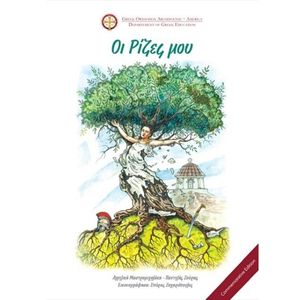 The Office of Greek Education, in cooperation with the High Council for Greek Education, is delighted to announce the publication of "H Rizes Mou." The book presents a glimpse into the Greek culture and its traditions. Educational and picturesque, this book teaches by example. Full color illustrations and informative text introduce Greek Orthodox holidays, traditions and cultural events that are observed.
The Office of Greek Education, in cooperation with the High Council for Greek Education, is delighted to announce the publication of "H Rizes Mou." The book presents a glimpse into the Greek culture and its traditions. Educational and picturesque, this book teaches by example. Full color illustrations and informative text introduce Greek Orthodox holidays, traditions and cultural events that are observed.
 In response to an overwhelming interest in the Summer 2023 camping ministry programs and in an effort to accommodate as many participants as possible, the Office of Ionian Village is updating its Summer 2023 dates.
In response to an overwhelming interest in the Summer 2023 camping ministry programs and in an effort to accommodate as many participants as possible, the Office of Ionian Village is updating its Summer 2023 dates.
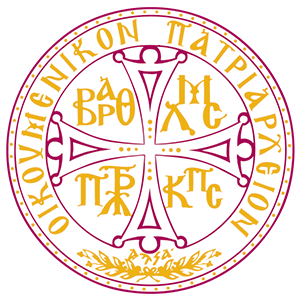 The 11th Academic Consultation between Judaism and Orthodox Christianity took place December 4-6, 2022, in Vienna, Austria. The theme was “Jewish-Orthodox Christian Dialogue: Navigating Our Relations to the World and to Each Other.” The Consultation was co-sponsored by the Ecumenical Patriarchate and the International Jewish Committee for Interreligious Consultations (IJCIC).
The 11th Academic Consultation between Judaism and Orthodox Christianity took place December 4-6, 2022, in Vienna, Austria. The theme was “Jewish-Orthodox Christian Dialogue: Navigating Our Relations to the World and to Each Other.” The Consultation was co-sponsored by the Ecumenical Patriarchate and the International Jewish Committee for Interreligious Consultations (IJCIC).
 Most honorable brother hierarchs,
Beloved children in the Lord,
Today our Holy Church celebrates the Nativity in the flesh of the pre-eternal Son and Word of God, this “foreign and strange mystery” that “was concealed from ages and from generations” (Col. 1:26).
Most honorable brother hierarchs,
Beloved children in the Lord,
Today our Holy Church celebrates the Nativity in the flesh of the pre-eternal Son and Word of God, this “foreign and strange mystery” that “was concealed from ages and from generations” (Col. 1:26).
Ninth Orthros Gospel
The Reading is from John 20:19-31
On the evening of that day, the first day of the week, the doors being shut where the disciples were for fear of the Jews, Jesus came and stood among them and said to them, "Peace be with you." When He had said this, He showed them His hands and His side. Then the disciples were glad when they saw the Lord. Jesus said to them again, "Peace be with you. As the Father has sent Me, even so I send you." And when He had said this, He breathed on them and said to them, "Receive the Holy Spirit. If you forgive the sins of any, they are forgiven; if you retain the sins of any, they are retained." Now Thomas, one of the twelve, called the Twin, was not with them when Jesus came. So the other disciples told him, "We have seen the Lord." But he said to them, "Unless I see in His hands the print of the nails, and place my finger in the mark of the nails, and place my hand in His side, I will not believe." Eight days later, His disciples were again in the house, and Thomas was with them. The doors were shut, but Jesus came and stood among them and said, "Peace be with you." Then He said to Thomas, "Put your finger here, and see My hands; and put out your hand, and place it in My side; do not be faithless, but believing." Thomas answered Him, "My Lord and My God!" Jesus said to him, "Have you believed because you have seen Me? Blessed are those who have not seen and yet believe." Now Jesus did many other signs in the presence of the disciples, which are not written in this book; but these are written that you may believe that Jesus is the Christ, the Son of God, and that believing, you may have life in His name.
Prokeimenon. 6th Tone. Psalm 27.9,1.
O Lord, save your people and bless your inheritance.
Verse: To you, O Lord, I have cried, O my God.
The reading is from St. Paul's Letter to the Colossians 3:4-11.
Brethren, when Christ who is our life appears, then you also will appear with him in glory. Put to death therefore what is earthly in you: fornication, impurity, passion, evil desire, and covetousness, which is idolatry. On account of these the wrath of God is coming upon the sons of disobedience. In these you once walked, when you lived in them. But now put them all away: anger, wrath, malice, slander, and foul talk from your mouth. Do not lie to one another, seeing that you have put off the old nature with its practices and have put on the new nature, which is being renewed in knowledge after the image of its creator. Here there cannot be Greek and Jew, circumcised and uncircumcised, barbarian, Scythian, slave, free man, but Christ is all, and in all.
12th Sunday of Luke
The Reading is from Luke 17:12-19
At that time, as Jesus entered a village, he was met by ten lepers, who stood at a distance and lifted up their voices and said: "Jesus, Master, have mercy on us." When he saw them he said to them, "Go and show yourselves to the priests." And as they went they were cleansed. Then one of them, when he saw that he was healed, turned back, praising God with a loud voice; and he fell on his face at Jesus's feet, giving him thanks. Now he was a Samaritan. Then said Jesus: "Were not ten cleansed? Where are the nine? Was no one found to return and give praise to God except this foreigner?" And he said to him: "Rise and go your way; your faith has made you well."
Saint Paul, first among hermits, was born about 227 in the Thebaid of Egypt. In 250 he fled into the wilderness because of the persecution raging at that time under Decius. Having lived a solitary life in a certain cave for ninety-one years, he reposed in 341, at the age of 114, and was buried by Anthony the Great, who had been directed thither by God several days before the Saint's repose.
Saint John, who was from Constantinople, was the son of illustrious parents -- Eutropius the Senator and Theodora. At twelve years of age he departed secretly from his home and went to the Monastery of the Unsleeping (see Dec. 29). Aflame with longing for his parents, he returned after six years to his father's home in the guise of a pauper and beggar. Living in a small hut at the gates of his parents' house (wherefrom he is called "hut-dweller"), he remained unknown therein for many years, and suffered mockery at the hands of those who had been his own servants. Foreknowing his death, he revealed himself to his parents, and within a few moments reposed, about the year 450.
Herod Agrippa, the grandson of Herod the Great and king of the Jews, grew wroth against the Church of Christ, and slew James, the brother of John the Evangelist. Seeing that this pleased the Jews, he took Peter also into custody and locked him up in prison, intending to keep him there until after the feast of the Passover, so that he could win the favour of the people by presenting him to them as a victim. But the Apostle was saved when he was miraculously set free by an Angel (Acts 12:1-19). The chains wherewith the Apostle was bound received from his most sacred body the grace of sanctification and healing, which is bestowed upon the faithful who draw nigh with faith.
That such sacred treasures work wonders and many healings is witnessed by the divine Scripture, where it speaks concerning Paul, saying that the Christians in Ephesus had such reverence for him, that his handkerchiefs and aprons, taken up with much reverence, healed the sick of their maladies: "So that from his body were brought unto the sick handkerchiefs or aprons, and the diseases departed from them, and the evil spirits went out of them" (Acts 19:12). But not only the Apostles' clothing (which certainly touched the bodies of the sick), but even their shadow alone performed healings. On beholding this, people put their sick on stretchers and beds and brought them out into the streets that, when Peter passed by, his shadow "might overshadow some of them"(Acts 5:15). From this the Orthodox Catholic Church has learned to show reverence and piety not only to the relics of their bodies, but also in the clothing of God's Saints.
Herod Agrippa, the grandson of Herod the Great and king of the Jews, grew wroth against the Church of Christ, and slew James, the brother of John the Evangelist. Seeing that this pleased the Jews, he took Peter also into custody and locked him up in prison, intending to keep him there until after the feast of the Passover, so that he could win the favour of the people by presenting him to them as a victim. But the Apostle was saved when he was miraculously set free by an Angel (Acts 12:1-19). The chains wherewith the Apostle was bound received from his most sacred body the grace of sanctification and healing, which is bestowed upon the faithful who draw nigh with faith.
That such sacred treasures work wonders and many healings is witnessed by the divine Scripture, where it speaks concerning Paul, saying that the Christians in Ephesus had such reverence for him, that his handkerchiefs and aprons, taken up with much reverence, healed the sick of their maladies: "So that from his body were brought unto the sick handkerchiefs or aprons, and the diseases departed from them, and the evil spirits went out of them" (Acts 19:12). But not only the Apostles' clothing (which certainly touched the bodies of the sick), but even their shadow alone performed healings. On beholding this, people put their sick on stretchers and beds and brought them out into the streets that, when Peter passed by, his shadow "might overshadow some of them"(Acts 5:15). From this the Orthodox Catholic Church has learned to show reverence and piety not only to the relics of their bodies, but also in the clothing of God's Saints.
Saint Anthony, the Father of monks, was born in Egypt in 251 of pious parents who departed this life while he was yet young. On hearing the words of the Gospel: "If thou wilt be perfect, go and sell what thou hast, and give to the poor" (Matt. 19:21), he immediately put it into action. Distributing to the poor all he had, and fleeing from all the turmoil of the world, he departed to the desert. The manifold temptations he endured continually for the span of twenty years are incredible. His ascetic struggles by day and by night, whereby he mortified the uprisings of the passions and attained to the height of dispassion, surpass the bounds of nature; and the report of his deeds of virtue drew such a multitude to follow him that the desert was transformed into a city, while he became, so to speak, the governor, lawgiver, and master-trainer of all the citizens of this newly-formed city.
The cities of the world also enjoyed the fruit of his virtue. When the Christians were being persecuted and put to death under Maximinus in 312, he hastened to their aid and consolation. When the Church was troubled by the Arians, he went with zeal to Alexandria in 335 and struggled against them in behalf of Orthodoxy. During this time, by the grace of his words, he also turned many unbelievers to Christ.
Saint Anthony began his ascetic life outside his village of Coma in Upper Egypt, studying the ways of the ascetics and holy men there, and perfecting himself in the virtues of each until he surpassed them all. Desiring to increase his labors, he departed into the desert, and finding an abandoned fortress in the mountain, he made his dwelling in it, training himself in extreme fasting, unceasing prayer, and fierce conflicts with the demons. Here he remained, as mentioned above, about twenty years. Saint Athanasius the Great, who knew him personally and wrote his life, says that he came forth from that fortress "initiated in the mysteries and filled with the Spirit of God." Afterwards, because of the press of the faithful, who deprived him of his solitude, he was enlightened by God to journey with certain Bedouins, until he came to a mountain in the desert near the Red Sea, where he passed the remaining part of his life.
Saint Athanasius says of him that "his countenance had a great and wonderful grace. This gift also he had from the Saviour. For if he were present in a great company of monks, and any one who did not know him previously wished to see him, immediately coming forward he passed by the rest, and hurried to Anthony, as though attracted by his appearance. Yet neither in height nor breadth was he conspicuous above others, but in the serenity of his manner and the purity of his soul." So Passing his life, and becoming an example of virtue and a rule for monastics, he reposed on January 17 in the year 356, having lived altogether some 105 years.
In the half-century after the First Ecumenical Council held in Nicea in 325, if there was one man whom the Arians feared and hated more intensely than any other, as being able to lay bare the whole error of their teaching, and to marshal, even from exile or hiding, the beleaguered forces of the Orthodox, it was Saint Athanasios the Great. This blazing lamp of Orthodoxy, which imperial power and heretics' plots could not quench when he shone upon the lampstand, nor find when he was hid by the people and monks of Egypt, was born in Alexandria about the year 296. He received an excellent training in Greek letters and especially in the sacred Scriptures, of which he shows an exceptional knowledge in his writings. Even as a young man he had a remarkable depth of theological understanding; he was only about twenty years old when he wrote his treatise "On the Incarnation." Saint Alexander, the Archbishop of Alexandria, brought him up in piety, ordained him his deacon, and after deposing Arius for his blasphemy against the Divinity of the Son of God, took Athanasios to the First Council in Nicea in 325. Saint Athanasios was to spend the remainder of his life laboring in defense of this Holy Council. In 326, before his death, Alexander appointed Athanasios his successor.
In 325, Arius had been condemned by the Council of Nicea; yet through his hypocritical confession of Orthodox belief, Saint Constantine the Great was persuaded by Arius's supporters that he should be received back into the communion of the Church. But Athanasios, knowing well the perverseness of his mind, and the disease of heresy lurking in his heart, refused communion with Arius. The heresiarch's followers then began framing false charges against Athanasios. Finally Saint Constantine the Great, misled by grave charges of the Saint's misconduct (which were completely false), had him exiled to Tiberius (Treves) in Gaul in 336. When Saint Constantine was succeeded by his three sons Constantine II, Constans, and Constantius, in 337, Saint Athanasios returned to Alexandria in triumph. But his enemies found an ally in Constantius, Emperor of the East, and he spent a second exile in Rome. It was ended when Constans prevailed with threats upon his brother Constantius to restore Athanasios (see also Nov. 6). For ten years Saint Athanasios strengthened Orthodoxy throughout Egypt, visiting the whole country and encouraging all: clergy, monastics, and lay folk, being loved by all as a father. After Constans's death in 350, Constantius became sole Emperor, and Athanasios was again in danger. On the evening of February 8, 356, General Syrianus with more than five thousand soldiers surrounded the church in which Athanasios was serving, and broke open the doors. Athanasios's clergy begged him to leave, but the good shepherd commanded that all the flock should withdraw first; and only when he was assured of their safety, he also, protected by divine grace, passed through the midst of the soldiers and disappeared into the deserts of Egypt, where for some six years he eluded the soldiers and spies sent after him.
When Julian the Apostate succeeded Constantius in 361, Athanasios returned again, but only for a few months. Because Athanasios had converted many pagans, and the priests of the idols in Egypt wrote to Julian that if Athanasios remained, idolatry would perish in Egypt, the heathen Emperor ordered not Athanasios's exile, but his death. Athanasios took a ship up the Nile. When he learned that his imperial pursuers were following him, he had his men turn back, and as his boat passed that of his pursuers, they asked him if he had seen Athanasios. "He is not far," he answered. After returning to Alexandria for a while, he fled again to the Thebaid until Julian's death in 363. Saint Athanasios suffered his fifth and last exile under Valens in 365, which only lasted four months because Valens, fearing a sedition among the Egyptians for their beloved Archbishop, revoked his edict in February, 366.
The great Athanasios passed the remaining seven years of his life in peace. Of his fifty-seven years as Patriarch, he had spent some seventeen in exiles. Shining from the height of his throne like a radiant evening star, and enlightening the Orthodox with the brilliance of his words for yet a little while, this much-suffering champion inclined toward the sunset of his life, and in the year 373 took his rest from his lengthy sufferings, but not before another luminary of the truth -- Basil the Great -- had risen in the East, being consecrated Archbishop of Caesarea in 370. Besides all of his other achievements, Saint Athanasios wrote the life of Saint Anthony the Great, with whom he spent time in his youth; ordained Saint Frumentius first Bishop of Ethiopia; and in his Paschal Encyclical for the year 367 set forth the books of the Old and New Testaments accepted by the Church as canonical. Saint Gregory the Theologian, in his "Oration On the Great Athanasios", said that he was "Angelic in appearance, more angelic in mind; ... rebuking with the tenderness of a father, praising with the dignity of a ruler ... Everything was harmonious, as an air upon a single lyre, and in the same key; his life, his teaching, his struggles, his dangers, his return, and his conduct after his return ... he treated so mildly and gently those who had injured him, that even they themselves, if I may say so, did not find his restoration distasteful."
Saint Cyril was also from Alexandria, born about the year 376. He was the nephew of Theophilus, Patriarch of Alexandria, who also instructed the Saint in his youth. Having first spent much time with the monks in Nitria, he later became the successor to his uncle's throne in 412. In 429, when Cyril heard tidings of the teachings of the new Patriarch of Constantinople, Nestorius, he began attempting through private letters to bring Nestorius to renounce his heretical teaching about the Incarnation. When the heresiarch did not repent, Saint Cyril, together with Pope Celestine of Rome, led the Orthodox opposition to his error. Saint Cyril presided over the Third Ecumenical Council of the 200 Holy Fathers in the year 431, who gathered in Ephesus under Saint Theodosius the Younger. At this Council, by his most wise words, he put to shame and convicted the impious doctrine of Nestorius, who, although he was in town, refused to appear before Cyril. Saint Cyril, besides overthrowing the error of Nestorius, has left to the Church full commentaries on the Gospels of Luke and John. Having shepherded the Church of Christ for thirty-two years, he reposed in 444.
Saint Macarius the Great was from the Thebaid of Egypt, a disciple, as some say, of Saint Anthony the Great. He was born about 331 and struggled in asceticism in the desert at Scete. Although young, he was called "the child elder" because of his great wisdom and austere manner of life. He was ordained presbyter and reposed in 391, at the age of sixty. There are fifty homilies ascribed to him.
It is said of Saint Macarius that he became as a God upon earth, for even as God protects the whole world, so did he cover the faults he saw as if he did not see them. Once he came back to his cell to find a thief taking his things and loading them on a camel. Macarius' non-possessiveness was so great that he helped the thief load the camel. When the camel refused to rise, Macarius returned to his cell and brought a small hoe, said that the camel wanted the hoe also, loaded it on, and kicked the camel telling it to get up. The camel obeyed Macarius' command, but soon lay down again, and would not move until everything had been returned to Macarius. His contemporary, Saint Macarius of Alexandria, was so called because he came from Alexandria and was therefore of that Greek-speaking colony; while Saint Macarius the Great is also called "of Egypt," that is, he belonged to the ancient race native to Egypt, the Copts.
The great teacher and invincible defender of the One, Holy, Catholic, and Apostolic Church, Saint Mark, was the offspring and scion of the imperial city, Constantinople. Reared by most pious parents, and instructed in secular and spiritual wisdom, he became preeminent in both. Saint Mark lived as an ascetic on the Prince's Islands and later in the monastery of Saint George Magana in Constantinople. He passed through all the degrees of the priesthood, and was finally advanced to the dignity of Archbishop and the lofty throne of the Metropolis of Ephesus. At the insistence of Emperor John Paleologos, the Saint was sent to the council of the Latins in Florence, to unite the churches that had been divided for so many years. He astounded the papal teachers with the divine wisdom of his words, and was the only one who did not sign the blasphemous decree of that false council. Because of this, the Holy Church of Christ has ever honored this great man as a benefactor, teacher, sole defender, and invincible champion of the Apostolic Confession. He reposed in 1443.
Saint Macarius of Alexandria, was so called because he came from Alexandria and was therefore of that Greek-speaking colony; while Saint Macarius the Great is also called "of Egypt," that is, he belonged to the ancient race native to Egypt, the Copts. Whenever Saint Macarius of Alexandria heard of a virtue practiced by any man, he strove to practice it even more fully himself. When he was already old, he visited the community of Saint Pachomius in Tabennisi and, without revealing who he was, asked admittance. Saint Pachomius, on account of Macarius' age, was reluctant to receive him, but after-wards yielded to his entreaties. Shortly thereafter Great Lent began, and Macarius followed such a severe rule of fasting and prayer that many in the brotherhood complained to Pachomius asking if he had brought this old man to put them to shame. Learning Macarius' identity in a revelation, Saint Pachomius thanked him for breaking the pride of his monks and sent him away in peace.
Saint Arsenius, who had Palestine as his homeland, was born in 876, the son of devout parents. From childhood he was consecrated to God and assumed the monastic habit. He studied in Seleucia, where he also received the dignity of the priesthood. After he had moved from thence to Constantinople, he was appointed Metropolitan of Corfu. He adorned the throne there by his virtue and instruction. When advanced in age, he returned to Constantinople and appeased the unjust rage of Emperor Constantine Porphyrogenitus against the leaders of Corfu. Finally, during his journey back to his see, he fell ill at Corinth and reposed in the Lord about the middle of the tenth century.
This Saint, who was from Melitene in Armenia, was the son of pious parents named Paul and Dionysia. He was born about 377. Since his mother had been barren, he was named Euthymius-which means "good cheer" or "joy"-for this is what his parents experienced at his birth. He studied under Eutroius, the Bishop of Melitene, by whom he was ordained and entrusted with the care of the monasteries of Melitene. Then, after he had come to Palestine about the year 406, he became the leader of a multitude of monks. Through him, a great tribe of Arabs was turned to piety, when he healed the ailing son of their leader Aspebetos. Aspebetos was baptized with all his people; he took the Christian name of Peter, and was later consecrated Bishop for his tribe, being called "Bishop of the Tents." Saint Euthymius also fought against the Nestorians, Eutychians, and Manichaeans. When Eudocia, the widow of Saint Theodosius the Younger, had made her dwelling in Palestine, and had fallen into the heresy of the Monophysites which was championed in Palestine by a certain Theodosius, she sent envoys to Saint Symeon the Stylite in Syria (see Sept. 1), asking him his opinion of Eutyches and the Council of Chalcedon which had condemned him; Saint Symeon, praising the holiness and Orthodoxy of Saint Euthymius near whom she dwelt, sent her to him to be delivered from her error (the holy Empress Eudocia is commemorated Aug. 13). He became the divine oracle of the Church, or rather, "the vessel of divine utterance," as a certain historian writes. He was the instructor and elder of Saint Sabbas the Sanctified. Having lived for ninety-six years, he reposed in 473, on January 20.
The divine Maximus, who was from Constantinople, sprang from an illustrious family. He was a lover of wisdom and an eminent theologian. At first, he was the chief private secretary of the Emperor Heraclius and his grandson Constans. When the Monothelite heresy became predominant in the royal court, out of hatred for this error the Saint departed for the Monastery at Chrysopolis (Scutari), of which he later became the abbot. When Constans tried to constrain him either to accept the Monothelite teaching, or to stop speaking and writing against it - neither of which the Saint accepted to do - his tongue was uprooted and his right hand was cut off, and he was sent into exile where he reposed in 662. At the time only he and his few disciples were Orthodox in the East (See also August 13).
The Martyr Neophytos, who was from Nicea in Bithynia, was the son of pious parents, Theodore and Florence. Led by grace from his childhood, he took up his dwelling in a cave upon Mount Olympus at the age of nine and lived there in asceticism and prayer. At the age of fifteen, during the reign of Diocletian about the year 290, he presented himself to the local Governor named Decius. Roused to fury by his unexpected boldness, Decius had him scourged, then laid out on a bed of fire. When he had been preserved by grace through these torments, he gave him up to wild beasts. But since the Saint remained unharmed, a certain pagan fell on him with a sword and slew him.
The Apostle Timothy, who was from Lystra of Lycaonia, was born of a Greek (that is, pagan) father and a Jewish mother. His mother's name was Eunice, and his grandmother's name was Lois (II Tim. 1:5). He became the disciple of the Apostle Paul when the latter first preached there, and he followed St. Paul during the whole period of the Apostle's preaching. Afterwards, Timothy was consecrated by him as first Bishop of the church in Ephesus. Under the supervision of John the Evangelist, who governed all the churches in Asia, he completed his life as a martyr in the year 97. He was stoned to death by the heathens, because, as some surmise, he opposed the festival held in honor of Artemis (Diana). The Apostle Paul's First and Second Epistles to Timothy were written to him.
Saint Anastasius was a Persian by race, the son of a Magus, and a soldier in the Persian army in the days of Chosroes II, King of Persia, and Heraclius, Emperor of New Rome. The Saint's Persian name was Magundat.
When Chosroes captured Jerusalem in the year 614 and took the Precious Cross away captive, Magundat heard the report of the miracles that came to pass through the Cross of our salvation. Being of a prudent mind, perplexed that an instrument of torture should be so highly honored by the Christians, yet seized with longing to learn their Faith, he diligently sought out instruction in the whole divine dispensation of Christ: His Incarnation, Passion, and Resurrection. When he learned what he sought to know, his soul was filled with wonder and joy. Withdrawing to the Holy City, he was baptized by Saint Modestus, Patriarch of Jerusalem, and became a monk, receiving the new name of Anastasius.
As he read the lives of the Saints and the accounts of the holy Martyrs, his heart was kindled with love for them to such a degree that he prayed to be counted worthy of a martyr's end like unto theirs. Finally, unable to contain his longing, he left his monastery. Encountering certain Persian Magi at Caesarea, he rebuked them for their delusion. Since Palestine was still held in the captivity of the Persians, he was taken before the Persian ruler, questioned, beaten, and imprisoned. He was then taken with other captives to Persia, where, after many tortures, refusing to espouse again the error of his fathers, he was hanged up by one hand, strangled with a noose, and beheaded. The translation of his holy relics is celebrated on the 24th of this month.